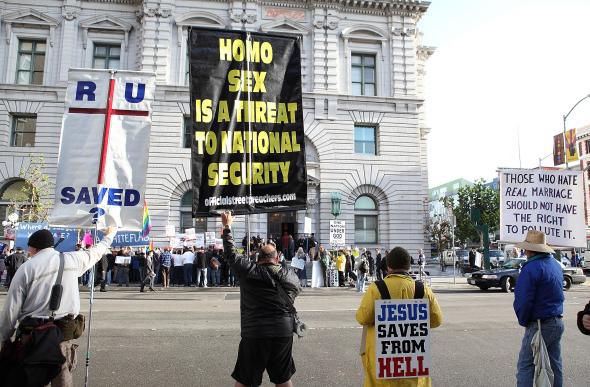Christian conservatives in the United States would like you to believe that we are in the middle of an ideological and philosophical war over the validity of the trans identity. They are incorrect. The war has come and gone. And Christian conservatives lost.
You might not know it given the rash of anti-trans legislation sailing through Republican-dominated statehouses. Conservatives are striving to frame these bills as the first coordinated offensive to drive back what the Weekly Standard earnestly calls World War T. In reality, these laws are a pitiful Hail Mary—a final, doomed attempt to reverse the growing American consensus that trans people are deserving of equal dignity. Despite a few temporary victories, the long-term consequence of the contemporary anti-trans movement will not be the long-hoped-for banishment of trans people from public life. Rather, the campaign will only serve to drive anti-trans Americans further out of the cultural mainstream, onto the fringes of society.
A recent Daily Beast article by Samantha Allen gestures toward this fact with a cheeky article titled “All the Things You Can No Longer Buy if You’re Really Boycotting Trans-Friendly Businesses.” Allen points to a boycott against Target—launched by the American Family Association, an anti-LGBTQ hate group—for reaffirming its trans-tolerant policies. Any consistent boycotter, Allen notes, shouldn’t post about their objections on Facebook, Twitter, or Google, all of which vehemently support trans rights.
“If you don’t want your money to go to a company that openly supports transgender people,” Allen writes, “you can’t buy an iPhone, eat an Egg McMuffin, drink a Sprite, stock up Budweiser, or fill your prescriptions at either of the nation’s two largest pharmacy chains because Apple, McDonald’s, Coca-Cola, Anheuser-Busch, Walgreens, and CVS” all advocate for trans tolerance, too. Anti-trans boycotters had also better blacklist Mastercard, Visa, American Express, and Discover; IKEA, Home Depot, JCPenney, Sears, and Nordstrom; Sony, Universal, Paramount, Disney, and Warner Bros.; Comcast, AT&T, and Time Warner—all companies with trans-inclusive policies. The list goes on.
So anti-trans activists can’t get on the internet, watch TV, hit the mall, or use a credit card without inadvertently supporting a pro-trans company. But that’s only the start of any mainstream American’s complicity in trans tolerance. Enjoy basketball? The National Basketball Association is vocally supportive of trans rights and is considering moving the 2017 All-Star Game out of North Carolina in response to the state’s anti-LGBTQ law. Watch ESPN? The network refuses to condone anti-trans bias and recently fired commentator Curt Schilling for posting a grotesque anti-trans meme on Facebook. Meanwhile, college athletic programs and undergraduate sports leagues across the country—the bullpen for our next generation of star athletes—have adopted trans-inclusive policies to virtually no controversy.
The anti-trans movement points to laws like North Carolina’s as proof that many Americans quietly but firmly oppose trans equality. That is extravagantly silly. Nineteen states plus Washington, D.C., and Puerto Rico explicitly forbid anti-trans discrimination. (At least 225 cities and counties also bar discrimination on the basis of gender identity.) By comparison, just three states explicitly require anti-trans discrimination: North Carolina (which restricts trans bathroom use), Tennessee (which lets mental health counselors refuse service to trans patients), and Mississippi (which broadly allows employers, businesses, landlords, and the government to discriminate against trans people). Meanwhile, several Republican governors in dark red states have recently vetoed or criticized pending anti-trans legislation, and the federal government has interpreted existing law to bar trans discrimination at school and in the workplace. If anti-trans advocates wish to preserve their right to fire, evict, or refuse service to trans people on the basis of gender identity, they are failing.
I don’t mean to suggest that trans Americans are not under siege by a wealthy and powerful conservative coalition; of course they are. But the truth is that the trans rights movement in 2016 is in roughly the same spot as the gay rights movement a decade ago: Anti-trans animus remains acceptable in some pockets of the United States, but those pockets are shrinking, and the rest of the country is quickly moving on. Between 2006 and today, gay representation grew exponentially—on TV, in movies, in politics, in sports, in our everyday lives. Friends and family came out; corporations adopted pro-equality policies; über-conventional, ratings-busting TV shows touted openly gay characters. The result was predictable: A supermajority of Americans grew comfortable with gay people and equal rights, while anti-gay holdouts became a bitter fringe, unable to even turn on the television without seeing images that offended them. They have become cultural castaways, utterly alienated from the mainstream, shrilly resentful about America’s rejection of their reactionary values.
And that is exactly what is occurring right now in the battle over trans rights. What are anti-trans advocates to do? Their religious-based fixation with an unchangeable gender binary is quickly collapsing under the weight of its own sophistry as millions of Americans adopt a nuanced (and open-minded) view of sex more closely aligned with biological realities. They cannot engage in life’s most basic activities without unintentionally contributing to a pro-trans business. The sports world, often viewed as a bastion of reactionary rigidity, has swiftly allied itself with the trans community and against anti-trans bias.
What cultural space will remain for anti-trans Americans 10 years from now? A few vitriolic corners of the internet? The increasingly deranged pages of the National Review? Whatever anti-trans spaces do survive, the country’s trans enlightenment will surely only serve to repel those who remain on the fence. And that is how the battle for trans rights ends: with a dwindling number of anti-trans holdouts, trapped in their own self-imposed exile, still furious that they could not persuade the country to boycott Target, turn off ESPN, and enshrine anti-trans bigotry into law.
